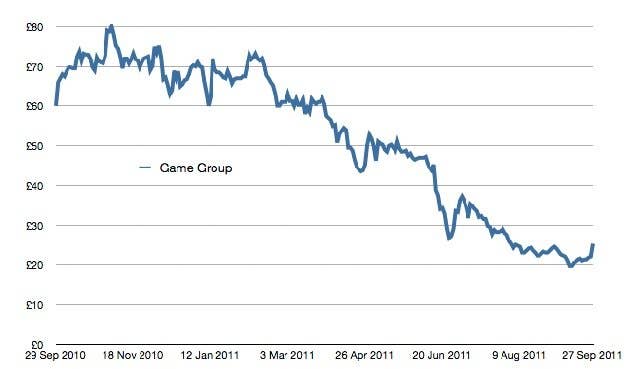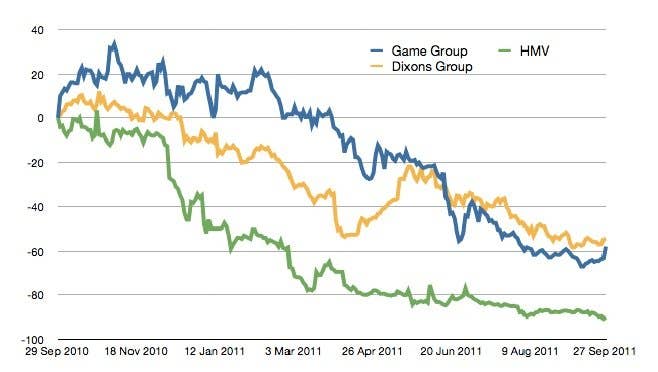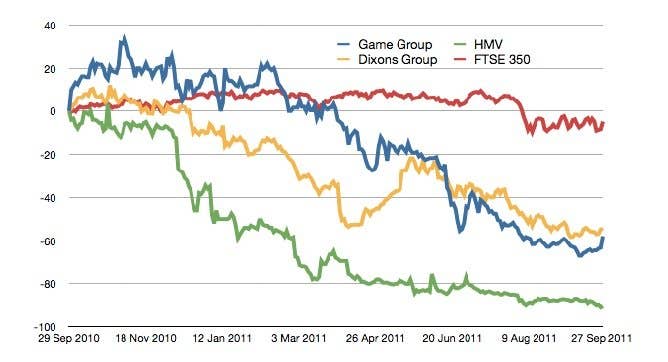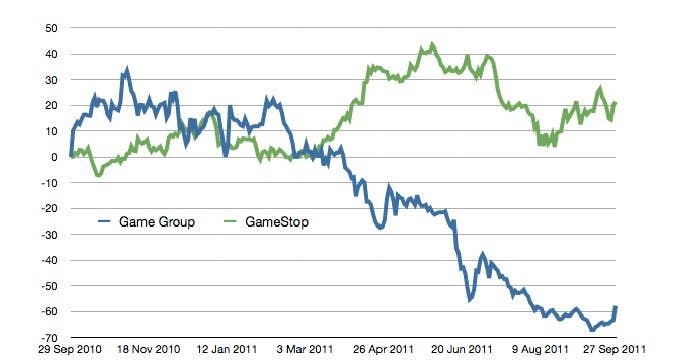Stock Ticker: GAME Group
Is an orderly, managed decline the best that the UK's largest specialist retailer can hope for?
This week's first half financial results for British specialist retailer The GAME Group were dreadful by anyone's measure. Talk about "tough trading conditions" only goes so far; GAME dropped 10% off its year on year sales, despite the launch of a new console (the admittedly under-performing 3DS), and its pre-tax losses doubled, topping the £50 million mark.
Yet interestingly, the stock market didn't respond by giving GAME's share price a kicking - rather, the company actually experienced a bit of a rally, with its stock price rising by a few points as the details of the financial report were processed by the market. Was there some gem of good news in there which the markets noticed but which wasn't highlighted in the media coverage?
In short, no, there wasn't. The response of the market looks positive, but it's actually an indication of just how negative the sentiment about GAME Group is right now - investors almost certainly expected GAME's results to be even worse than they actually were, so the stock rallied slightly when the bad news turned out to be marginally less bad than anticipated. The reality is that unless they'd been vastly more awful, GAME's results were never going to move the stock price very much - the markets have already given the company a kicking over the past 12 months, and the expectation of disappointing results is very much allowed for in the share price now.

The problems facing GAME have been explored in great depth across the trade press and financial press, and perhaps the most distressing thing for the company is that few of the problems are of its own creation. As a growing retail chain, GAME has been almost exemplary in its management - the issue is that specialist retailers in this sector are rapidly being rendered obsolete, squeezed on one side by the deep discounting of supermarkets and on the other by competition from online retailers and digital download services.
As a result, it should be no surprise that it's not just GAME whose share price graph looks unhealthy right now - it's a problem which spreads across specialist retail in general in the UK. The two publicly listed firms most commonly grouped together with GAME by UK investors are the Dixons Group - largely a consumer electronics retailer but with a significant sideline in videogame products - and HMV, whose game sales have become a key pillar for the music and movie retailer.

Graphing the three retailers together reveals how much worse things could be for GAME Group, and perhaps explains why the stock market seems relieved rather than horrified by the firm's latest results. Indeed, perhaps the best thing that can be said about GAME is that "at least it's not HMV" - the 60% of its share value which GAME has lost over the past year is peanuts compared to the shocking market performance of HMV, which has dropped almost 90% of its value. Indeed, GAME's performance is comparable with Dixons, a much larger retailer (Dixons' market capitalisation is over £400 million, compared to around £80 million for GAME) in a somewhat more stable business sector.
Yet the fact that HMV stock is performing so much worse doesn't change the reality of what's happening to GAME Group. It would be silly to find much optimism in the fact that the company's management is doing a fine job of managing the decline of the firm's entire market sector - "well-managed decline" is hardly an attractive option for an investor, after all, and it speaks of a company which doesn't see a path forward as the industry continues to turn away from boxed retail products.
It's also important to dismiss the talk of "tough market conditions", which carries with it false hope that GAME's business might pick up when the country's economic conditions improve. The quickest way to puncture that idea is to look at how the performance of the specialist retail sector stacks up with the overall performance of British companies - in this instance, I'm using the FTSE 350 index, which tracks the top 350 listed firms in the UK, as the red line on the comparison graph.

As you can see, while GAME somewhat outperformed the rest of the stock market in the trailing months of last year, the picture in 2011 to date is completely bleak. It's interesting to note that the serious decline of the stock kicks in around the time of the Nintendo 3DS launch. It's likely that some investors were expecting the 3DS to provide UK retailers with a fairly major boost during the first half of this year, and have thus far been disappointed - but it's equally likely that the poor sales of the 3DS have acted as a wake-up call for many investors, forcing them to acknowledge the fact that specialist retailers are facing an "evolve or die out" challenge which few of them seem equipped to overcome.
Perhaps the best thing that can be said about GAME is that "at least it's not HMV".
Something it's worth bearing in mind when we talk about stock market performance is that the investors who really move the price of a stock are not private individuals or traders with a specific interest in the company in question. For the most part, large stock trades are carried out on behalf of institutions, by traders whose knowledge and understanding of the specifics of the business whose shares they're trading is extremely limited, and largely focused on financial data and perhaps a few analyst reports.
As such, it's the big, sweeping, headline stories about a company or a market sector which manage to filter into the consciousness of traders, and in the case of GAME Group (and indeed HMV), those headline stories are not positive. The firm's growth has slowed to a halt and it is now in decline, and it hasn't got a clear strategy to transition its business to take advantage of new opportunities and escape from the sinking ship of traditional specialist retail. That one-line summary and a glance at GAME Group's financials is all most traders feel that they need to know, and they're quite probably right.
In this instance, the lack of a clear strategy for GAME Group's future is the real kicker. Traditional specialist retail is suffering across the board, as HMV and Dixons demonstrate - but if you look outside the UK, it's clear that some companies are doing far better than others at making the leap away from specialist retail before the ship sinks entirely. Take a look at how the performance of giant US specialist retailer GameStop over the past 12 months compares with that of GAME Group:

As you can see, being in specialist retail doesn't have to be the kiss of death - and while plenty of industry insiders and commentators are dubious about how effective GameStop's future plans (which range from digital distribution and streaming services through to the launch of an Android-based gaming tablet to compete with the iPad), the markets are obviously happy to see that GameStop at least has those proactive, forward-looking plans.
The UK's specialist retailers, on the other hand, seem content to simply have an orderly, well-managed decline into obsolescence. If they're not content with this state of affairs, then they're certainly showing no signs of being capable of breaking out of it and improving their lot. Right now, the best that retailers like GAME Group seem able to do is to try and grab a slightly bigger slice of the ever-shrinking pie by using its muscle with publishers to secure exclusive special editions of major titles. This tit-for-tat squabbling between retailers is not unlike rearranging the deckchairs while the Titanic sinks - far bolder, braver and more thoughtful moves will be required if GAME Group is to make any steps towards halting its decline.
